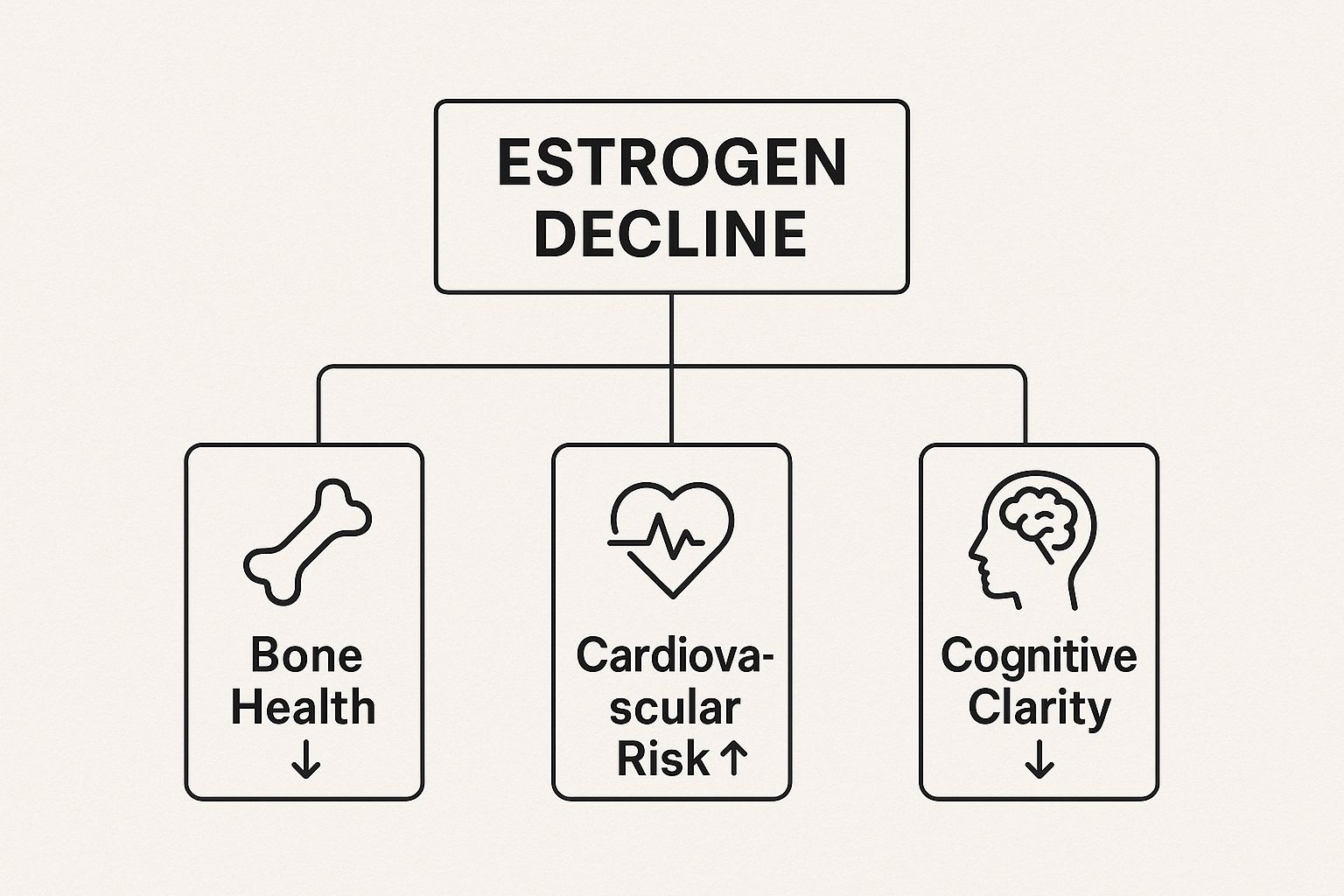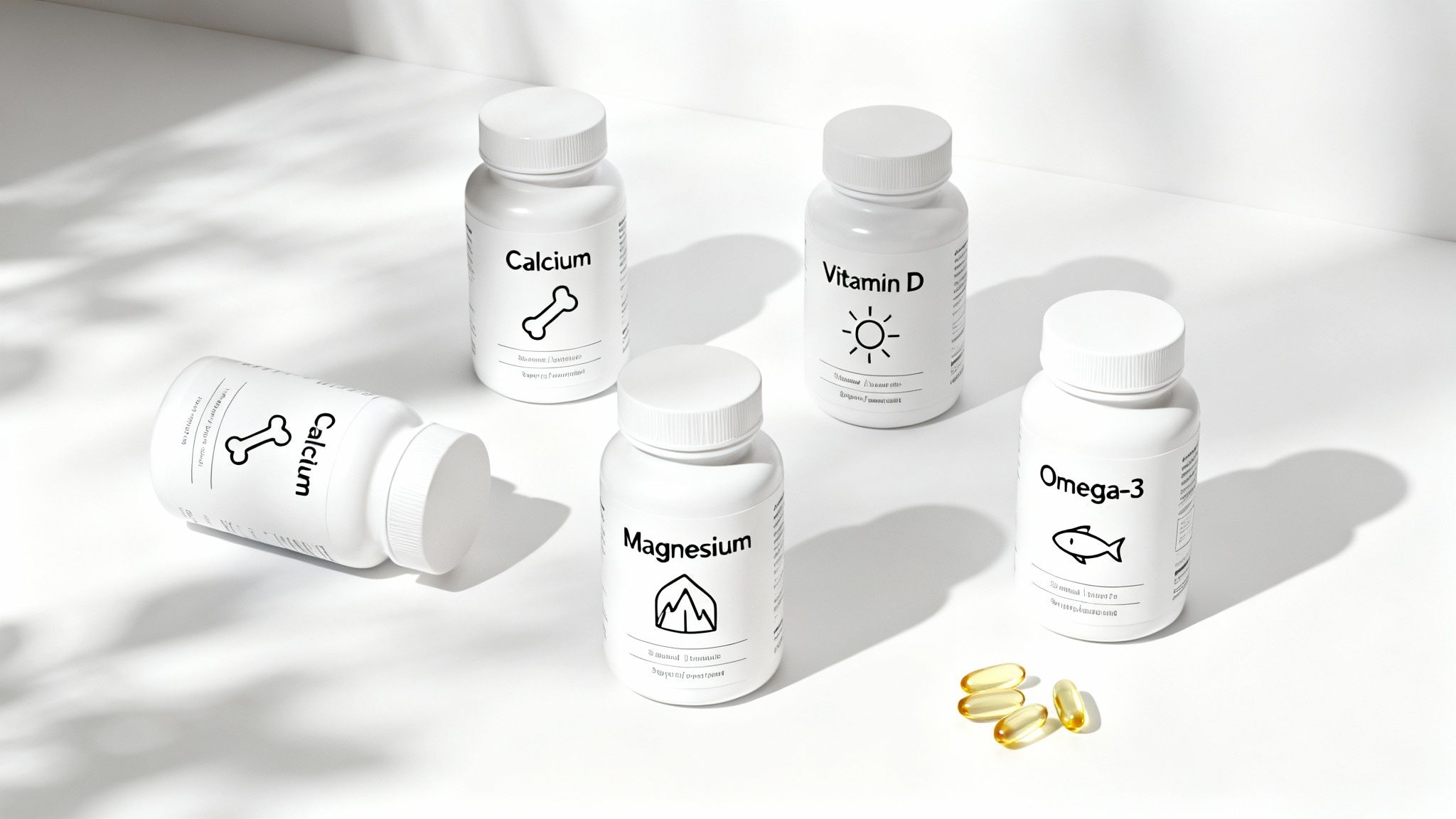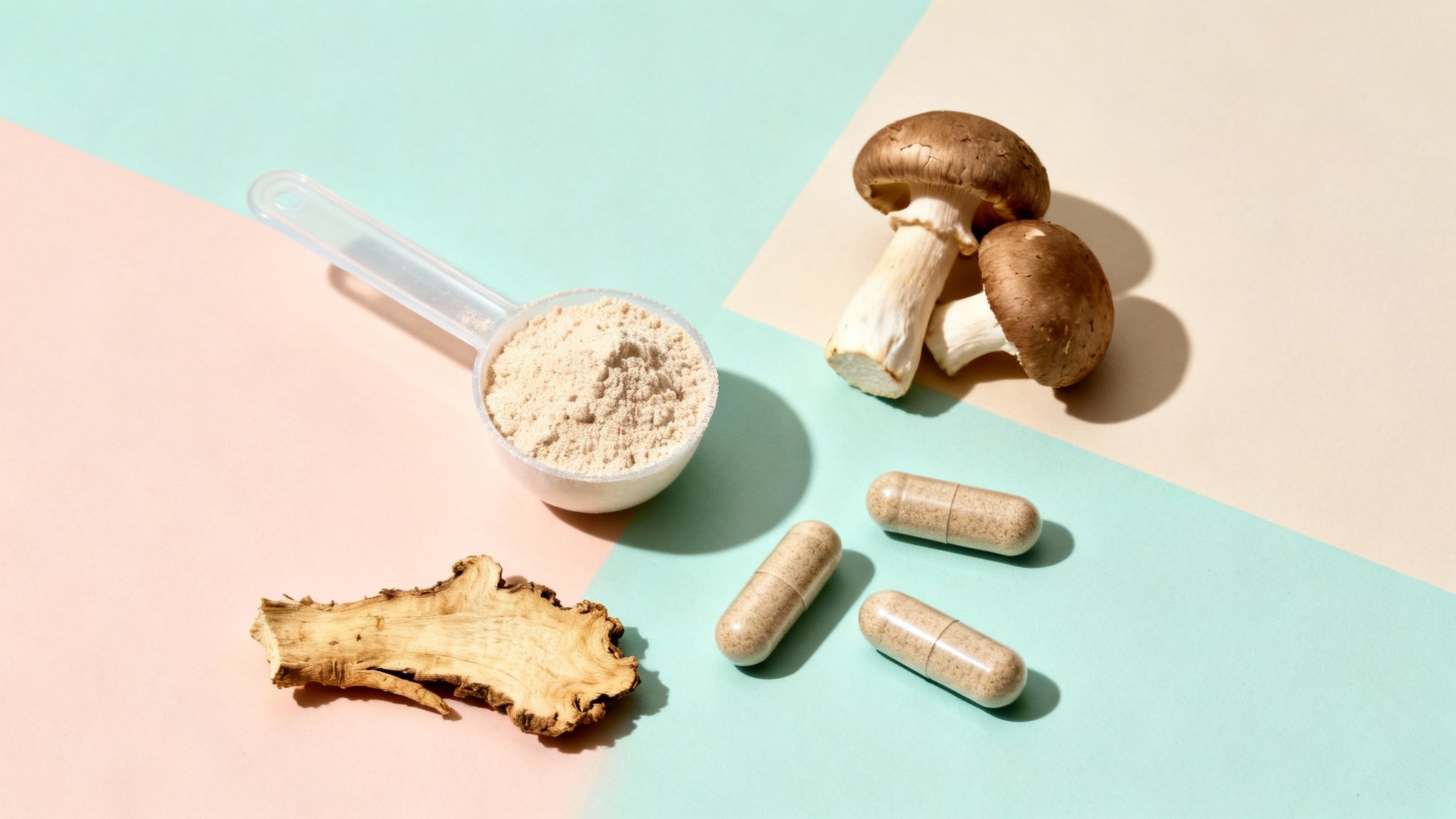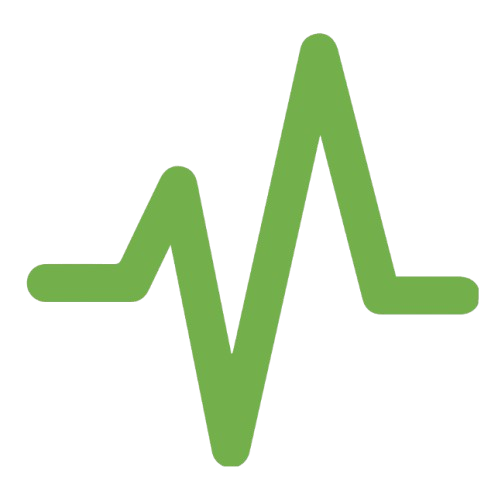
Post Menopause Supplements for Health and Vitality
Share
Welcome to your next chapter. Post-menopause isn't an ending; it’s a new beginning that calls for a mindful approach to your well-being. This is where targeted post-menopause supplements can be a game-changer, offering powerful support when paired with a healthy lifestyle to help manage your body's new normal.
Navigating Your Health in Post-Menopause

Entering post-menopause is less of a destination and more of an evolution. This life stage brings a unique set of changes as oestrogen levels permanently decline, influencing everything from your bone strength to your mental clarity. But rather than seeing this as a loss, we can frame it as a fantastic opportunity to become more intentional with our health.
This shift calls for a new strategy. What worked for your body in your 30s or 40s might not be hitting the mark anymore. The goal now is to give your body the specific nutrients it needs to thrive for decades to come.
Understanding the New Landscape
That dip in oestrogen has a bit of a domino effect across several key areas of your health. Getting to grips with these changes is the first step toward tackling them proactively. The main areas we need to focus on include:
- Bone Density: Lower oestrogen can speed up bone loss, which unfortunately increases the risk of osteoporosis.
- Heart Health: These hormonal shifts can affect cholesterol levels and overall cardiovascular function.
- Cognitive Performance: Many women report experiencing "brain fog" or changes in memory and focus. It’s a real thing!
- Muscle Mass: Maintaining strength becomes more of a challenge, which can impact your metabolism and mobility.
This growing awareness is definitely being reflected in the market, with more and more women seeking out natural, non-hormonal ways to manage their health. In fact, the UK menopause market, which includes post-menopause supplements, hit USD 490.1 million in 2024 and is expected to climb to USD 648.1 million by 2030. Dietary supplements are the biggest piece of that pie, showing a clear preference for nutritional support. You can read the full research on the UK menopause market to learn more.
Think of this guide as your practical, science-backed roadmap. It’s designed to help you feel understood and armed with the knowledge to make confident, informed choices for your long-term vitality.
This article will set the stage for how the right supplements, combined with a healthy lifestyle, can provide powerful and targeted support during this important transition.
Why Your Body's Needs Change After Menopause
Getting your head around why your body has a new set of rules after menopause is the first real step towards looking after yourself properly. Think of oestrogen as your body's master conductor, effortlessly keeping dozens of biological processes in sync. When its levels drop off after menopause, the orchestra doesn’t stop playing, but the tune definitely changes.
This hormonal shift is the main reason your nutritional needs evolve. It’s not simply about getting older; it's a specific biological transition that hits your bones, heart, and brain in very particular ways. Once you understand these changes, you can see exactly why certain nutrients suddenly become so important and how post-menopause supplements can strategically fill the gaps.
The Impact on Your Bone Health
One of the most well-known effects of falling oestrogen is the hit it takes on bone density. Oestrogen plays a huge part in regulating bone turnover—that constant cycle of breaking down old bone and building new stuff.
Imagine your bones have a dedicated construction crew. Oestrogen is the project manager, making sure the demolition team and the building team are working in perfect harmony. After menopause, this manager isn't around as much. As a result, the demolition crew (cells called osteoclasts) can start working faster than the building crew (osteoblasts), leading to a gradual loss of bone mass.
This imbalance is exactly why the risk of osteoporosis, a condition that makes bones brittle and more likely to fracture, shoots up. In fact, studies show that muscle mass can also plummet by as much as 15% in the five years after menopause, which further compromises the strength and stability of your skeleton.
Changes in Cardiovascular Function
Oestrogen also has a protective effect on your heart and circulation. It helps to keep blood vessels flexible, manages cholesterol, and generally supports your cardiovascular system.
When oestrogen levels fall, you might start to see changes in your lipid profile, like a rise in LDL ("bad") cholesterol and a drop in HDL ("good") cholesterol. This shift can contribute to a higher risk of heart-related issues, which is a key reason why cardiovascular health becomes an even bigger priority in the post-menopausal years.
A Closer Look at Cognitive Performance
Ever had one of those "brain fog" moments where you can't quite grasp a thought? You're definitely not alone. Oestrogen has a big influence on brain function, supporting memory, focus, and overall mental clarity. It helps with producing neurotransmitters and promotes healthy blood flow to the brain.
As oestrogen declines, these cognitive support systems can take a knock, leading to those frustrating moments of forgetfulness or finding it hard to concentrate. This isn't a reflection of your intelligence, but a real physiological change that needs the right nutritional support to keep your brain healthy and sharp.
This infographic gives a clear visual summary of how declining oestrogen affects these three critical areas of your health.

As you can see, the reduction in oestrogen creates a cascade of effects. This makes proactive support for your bones, heart, and brain an absolute must for long-term wellbeing.
Understanding this new biological landscape is empowering. It allows you to move from reacting to changes to proactively supporting your body's new needs with targeted nutrition and lifestyle choices.
By recognising these core shifts, the role of specific post-menopause supplements starts to make perfect sense. They aren’t just random vitamins; they are tools chosen to address the precise physiological challenges that pop up when oestrogen's influence fades, helping you build a resilient foundation for the years ahead.
Foundational Supplements for Post-Menopausal Health

Now that we’ve covered the why, let's get into the what. Putting together a smart, effective supplement plan for post-menopause isn't about grabbing everything off the shelf. It’s about building a solid foundation first. These are the non-negotiables, the core nutrients your body is crying out for to navigate its new normal.
Think of it like building a house. Before you can even think about paint colours or fancy light fixtures, you need to pour the concrete and put up the frame. These foundational supplements are your frame, providing the core support needed for strong bones, a healthy heart, and a sharp mind.
This focus on targeted nutrition is catching on. The UK dietary supplements market was valued at USD 3.13 billion in 2024 and is expected to rocket to USD 8.19 billion by 2034. A huge part of that growth is driven by women seeking out specific support for bone density, joint health, and mood during and after menopause. It’s clear we’re getting smarter about what our bodies need.
Calcium and Vitamin D: The Bone Health Duo
Protecting your bones becomes priority number one after menopause. Calcium is the main mineral that gives your skeleton its strength and structure, a bit like the bricks in a wall. But those bricks are just a pile on the ground if you don’t have a builder to put them in place.
That’s where Vitamin D comes in. Vitamin D is the essential gatekeeper that unlocks the door, allowing your body to actually absorb the calcium from your food and deposit it into your bones. No matter how much calcium you get, without enough Vitamin D, it just can't get to where it needs to be.
This partnership is absolutely critical post-menopause. The drop in oestrogen speeds up bone loss, so a steady supply of both nutrients is vital to push back against this process and lower the risk of osteoporosis.
For UK adults, the general advice is 700mg of calcium per day, though some experts suggest post-menopausal women should aim for up to 1,200mg. For Vitamin D, a daily supplement of 10 micrograms (400 IU) is recommended, especially during the darker autumn and winter months.
Magnesium: The Unsung Hero
While Calcium and Vitamin D often steal the spotlight, magnesium is the quiet, hardworking manager making everything happen behind the scenes. It’s involved in over 300 different processes in the body, and its importance for post-menopausal women simply can’t be overstated.
Magnesium actually helps convert Vitamin D into its active form, making it the crucial third member of the bone-building team. It also supports muscle function, which is key for maintaining strength and stability—further protecting your bones from fractures.
Beyond your skeleton, magnesium is a powerhouse for your nervous system. It helps regulate the brain chemicals that promote calm and relaxation, which can be a game-changer for managing the mood swings and sleep troubles that often appear at this stage. Many women find a magnesium supplement before bed works wonders for their sleep quality.
The UK's recommended daily intake for women is 270mg. While you can find it in leafy greens, nuts, and seeds, a supplement is often needed to get enough for real therapeutic benefits.
Key Takeaway: Think of Calcium as the bricks, Vitamin D as the gatekeeper, and Magnesium as the construction manager. All three must work together to build and maintain a strong bone framework post-menopause.
Omega-3 Fatty Acids: For Heart and Brain
Omega-3s are healthy fats that offer incredible benefits for your heart and brain—two areas that need a bit of extra TLC after menopause. The most beneficial types are EPA (eicosapentaenoic acid) and DHA (docosahexaenoic acid), which are found mainly in oily fish.
For your heart, omega-3s are true champions. They help to:
- Keep blood pressure at healthy levels.
- Lower triglycerides (a type of fat in your blood).
- Support overall artery health and reduce inflammation.
These benefits become even more important as the natural protection oestrogen once gave your cardiovascular system fades. When it comes to your brain, DHA is a major structural part of your brain tissue. Getting enough is vital for maintaining cognitive function, memory, and focus, helping you fight off that frustrating 'brain fog' many women experience.
While there isn't a specific UK guideline for EPA and DHA, health bodies generally recommend eating at least two portions of fish a week, with one being oily. If you don't eat fish, a high-quality fish oil or algae-based omega-3 supplement is a fantastic alternative.
To help you keep track, here's a quick summary of these essential nutrients.
Essential Nutrients for Post-Menopausal Wellbeing
| Supplement | Primary Post-Menopause Benefit | Common Food Sources |
|---|---|---|
| Calcium | Maintains bone density and strength to reduce fracture risk. | Dairy products, leafy greens (kale), fortified foods, tofu. |
| Vitamin D | Essential for calcium absorption and immune support. | Oily fish (salmon, mackerel), egg yolks, fortified cereals. |
| Magnesium | Supports bone health, muscle function, and nervous system calm. | Nuts, seeds, leafy greens (spinach), dark chocolate. |
| Omega-3s (EPA/DHA) | Promotes heart health and maintains cognitive function. | Oily fish (salmon, sardines), flaxseeds, walnuts, chia seeds. |
Getting these core nutrients right is the best first step you can take.
Finally, while these foundational supplements are critical, a high-quality multivitamin can act as a great nutritional safety net. Think of it as filling in any small, unseen gaps in your diet to support overall energy and vitality. For a deeper look, check out our complete guide on finding the best multivitamin for women.
Targeted Support For Energy, Stress, and Cognition

Once you’ve got that solid nutritional foundation sorted, we can get a bit more specific and look at the challenges that really define the post-menopause experience. This is where we shift from general upkeep to targeted, personal support. So many women at this stage find themselves dealing with a frustrating trio: fatigue, heightened stress, and that infamous ‘brain fog’.
But here's the thing – you don't have to just accept these as an inevitable part of getting older. You can tackle them head-on with a few smart additions to your daily routine.
Think of it like fine-tuning your wellness strategy. Your foundational supplements are the engine, but these targeted supports are the high-performance fuel and precision parts that keep everything running smoothly day-to-day.
Sharpen Your Mind with Creatine
When you hear "creatine," you probably picture a bodybuilder in a gym. But a wave of new research is showing just how powerful it can be for women post-menopause, and its benefits go way beyond muscle. Creatine is a natural compound that helps your body whip up energy for short, intense bursts of effort – whether that’s lifting a weight or solving a problem.
Let’s be honest, maintaining muscle mass after menopause is a real challenge. As oestrogen dips, we can lose muscle at a faster rate, a condition called sarcopenia. Creatine gives your muscles an immediate energy source, which can seriously improve your performance during strength training, helping you build and hang on to that crucial lean mass. This isn't just about metabolism; it's about strengthening the very muscles that protect your bones.
Perhaps even more exciting is what creatine does for your brain. Our brains are incredibly energy-hungry, and creatine helps fuel them. For women battling mental fatigue or brain fog, it can be a total game-changer. Studies have shown it can improve short-term memory and reasoning, offering a much-needed mental boost.
Manage Cortisol with Ashwagandha
Does stress feel like it’s been dialled up a few notches since menopause? You’re not imagining it. With the calming influence of oestrogen on the decline, the body’s main stress hormone, cortisol, can run a bit wild. This can spark feelings of anxiety, irritability, and broken sleep, trapping you in a vicious cycle of stress and exhaustion.
Enter Ashwagandha. It’s a well-studied adaptogen – a special class of herbs that help your body adapt and become more resilient to stress, whether it’s physical, chemical, or biological. It works by helping to regulate your body’s central stress response system.
By helping to balance cortisol levels, Ashwagandha encourages a sense of calm and resilience. It doesn’t numb you to stress; it just helps your body manage it better, stopping that constant ‘wired but tired’ feeling in its tracks.
For many post-menopausal women, this means better sleep, a more stable mood, and the ability to handle daily pressures without feeling completely overwhelmed. Alongside supplements, simple practices like Pranayama for anxiety relief can be a fantastic way to double down on managing the stress that often comes with this life stage.
Boost Resilience with Mushroom Blends
Functional mushrooms like Lion's Mane, Reishi, and Cordyceps have been staples in traditional medicine for centuries, and modern science is finally catching on to why they’re so effective. These aren't the mushrooms you’d find on a pizza; they are potent natural compounds that can support your brain health, immune function, and energy.
Let's break down a few of the key players:
- Lion's Mane: Often called the 'smart mushroom', Lion's Mane is famous for its brain-protecting properties. It contains compounds that encourage the growth of brain cells and may help sharpen focus, memory, and overall cognitive function.
- Reishi: Known as the 'mushroom of immortality', Reishi is another powerful adaptogen. It's particularly loved for its calming effects, helping to dial down stress and support restful sleep—making it a brilliant partner for Ashwagandha.
- Cordyceps: If you’re feeling that afternoon slump, Cordyceps might be your new best friend. It’s known to support energy and stamina by helping the body use oxygen more efficiently, making it a popular choice for fighting fatigue.
A good-quality mushroom blend will combine the benefits of several different types, giving you broad-spectrum support for your brain, body, and immune system.
Cover Your Bases with a High-Quality Multivitamin
Even with the best diet and targeted supplements, it’s all too easy to have small nutritional gaps. A high-quality multivitamin acts as your daily insurance policy, making sure you’re covering all the essential micronutrient bases for good health. After menopause, certain nutrients become even more critical for energy and vitality.
This is especially true for the B vitamins. This family of eight different vitamins is absolutely essential for converting the food you eat into energy your body can actually use. They’re involved in everything from brain function and nerve health to making red blood cells. A dip in B vitamins, particularly B12, can lead to serious fatigue and cognitive issues.
A well-designed multivitamin for women over 40 will provide these crucial nutrients in their most bioavailable forms. This ensures your body can absorb and use them properly, helping to keep your energy levels steady and support your overall wellbeing. To get the full picture, you can learn more about what the vitamin B complex is good for in our detailed guide.
By personalising your approach with these targeted post menopause supplements, you can effectively meet the unique challenges of this stage of life. You’re not just managing symptoms; you’re building a resilient system that supports vibrant energy, a calm mind, and sharp thinking for years to come.
How to Choose Safe and Effective Supplements
Walking into the supplement aisle can feel overwhelming. With countless bottles all promising the world, how do you separate the genuinely helpful products from the clever marketing? Becoming a savvy consumer is your best defence for building a regimen of post-menopause supplements that is both safe and actually works.
Choosing a quality supplement is less about flashy labels and more about understanding what’s inside the bottle. A crucial skill here is knowing how to properly read the product information. If you can master the art of deciphering food and supplement labels, you can make choices that empower your health and invest in products that truly deliver.
Decoding the Supplement Label
The first step is to become a bit of a label detective. Don't just glance at the brand name; turn the bottle around and find the "Supplement Facts" panel. This is where the real story is told.
You're looking for two key details: the active ingredients and their dosages. You’ll want to make sure the amounts listed are in line with what clinical research suggests is effective for post-menopausal health. Vague terms like "proprietary blend" can be a red flag, as they often hide low, ineffective doses of the good stuff.
The Importance of Bioavailability
Next up, consider the form of the nutrient. This is a detail that’s easy to overlook, but it's absolutely vital for effectiveness. The form determines a supplement's bioavailability—a simple term for how much of the nutrient your body can actually absorb and put to use.
Think of it like trying to unlock a door. You might have a dozen keys, but only the one with the right shape will work. In the same way, your body can absorb some nutrient forms far more easily than others.
A perfect example of this is magnesium. Magnesium oxide is cheap and common, but your body really struggles to absorb it. Magnesium citrate or glycinate, on the other hand, are far more bioavailable. This means more of the mineral gets into your system to support sleep, muscles, and bone health. You can learn more about the best forms and timings in our guide on the best time to take magnesium.
Quality Checks and Certifications
Finally, look for signs of quality control. The supplement industry isn't as tightly regulated as pharmaceuticals, so trustworthy brands will voluntarily seek out third-party certifications to prove their products are pure and safe.
Keep an eye out for these green flags on the label:
- GMP (Good Manufacturing Practices) Certification: This ensures the product was made in a clean, controlled facility that follows strict quality standards.
- Third-Party Testing: Seals from organisations like NSF International or USP (United States Pharmacopeia) confirm that the product contains what the label says it does and is free from harmful contaminants.
On the flip side, be wary of red flags like exaggerated claims ("cures all menopause symptoms!"), a lack of contact information for the company, or an absence of any quality seals. By applying these checks, you can confidently choose supplements that offer real value for your health.
Common Questions About Post-Menopause Supplements
Stepping into the world of post-menopause supplements can definitely bring up a few questions. Let's tackle some of the most common ones I hear, so you can feel clear and confident about supporting your health.
Do I Need to Take These Supplements Forever?
It’s best to think of post-menopause supplementation as a long-term strategy for your health. The hormonal shifts that happen during menopause are permanent, which means your body’s increased need for certain nutrients—like calcium and vitamin D for your bones—isn’t going anywhere either.
Think of it as an essential part of your wellness toolkit, right alongside a healthy diet and staying active. Of course, your body isn't static, and your needs might change as the years go by. That’s why regular check-ins with your healthcare provider are so crucial. They can help you tweak your plan to make sure it’s always a perfect fit for you.
Can I Get All These Nutrients From My Diet Alone?
While a healthy, balanced diet is always the number one priority, it can be incredibly tough to get everything you need from food alone, especially after menopause. Some nutrient requirements just become too high to meet consistently through meals.
Take vitamin D, for instance. Here in the UK, getting enough from sunlight and food is notoriously difficult, particularly in the autumn and winter. Similarly, hitting the therapeutic doses of Omega-3s needed to really support your heart and brain would mean eating far more oily fish than most of us manage day to day.
Think of high-quality supplements as your nutritional insurance policy. They’re there to fill in the gaps, giving your body the consistent, reliable support it needs to stay strong and vibrant for the long haul.
How Soon Will I Notice a Difference?
This really varies depending on the supplement and your own unique body. Some benefits show up quite quickly. You might notice that magnesium helps you sleep better or ashwagandha eases your stress levels within just a few weeks of consistent use.
Others, however, are playing the long game. Nutrients like calcium and vitamin D are working quietly in the background to build bone density, while creatine is helping maintain muscle mass. You won't necessarily 'feel' these changes day-to-day, but their preventative benefits are building up over months and years.
Consistency is everything. It’s much more helpful to see supplements as a long-term investment in your future self, rather than a quick fix for today’s symptoms.
Are There Any Supplements I Should Avoid?
Yes, absolutely. While many supplements are incredibly helpful, some might not be right for you or could even interfere with medications you're taking. This is where getting personalised advice is non-negotiable.
For example, most post-menopausal women don't need to take extra iron unless they have a diagnosed deficiency, because the risk of anaemia drops significantly once periods stop. Certain herbal supplements can also cause problems with prescription drugs, like blood thinners or blood pressure medication.
This is exactly why you should always talk to a qualified health professional before starting anything new. They can look at your whole health picture and make sure any supplements you add are both safe and genuinely beneficial for you.
Ready to take the guesswork out of your health? The VitzAi platform uses smart technology to analyse your unique needs and recommend a supplement plan that's right for you. Start your journey to optimised health by taking our free wellness quiz today at https://vitzai.com.
This article is for informational purposes only and is not medical advice. Always consult a qualified health professional before starting any new supplement or major lifestyle change.
